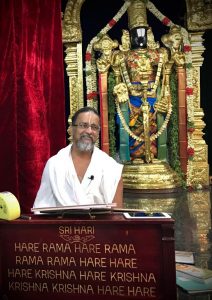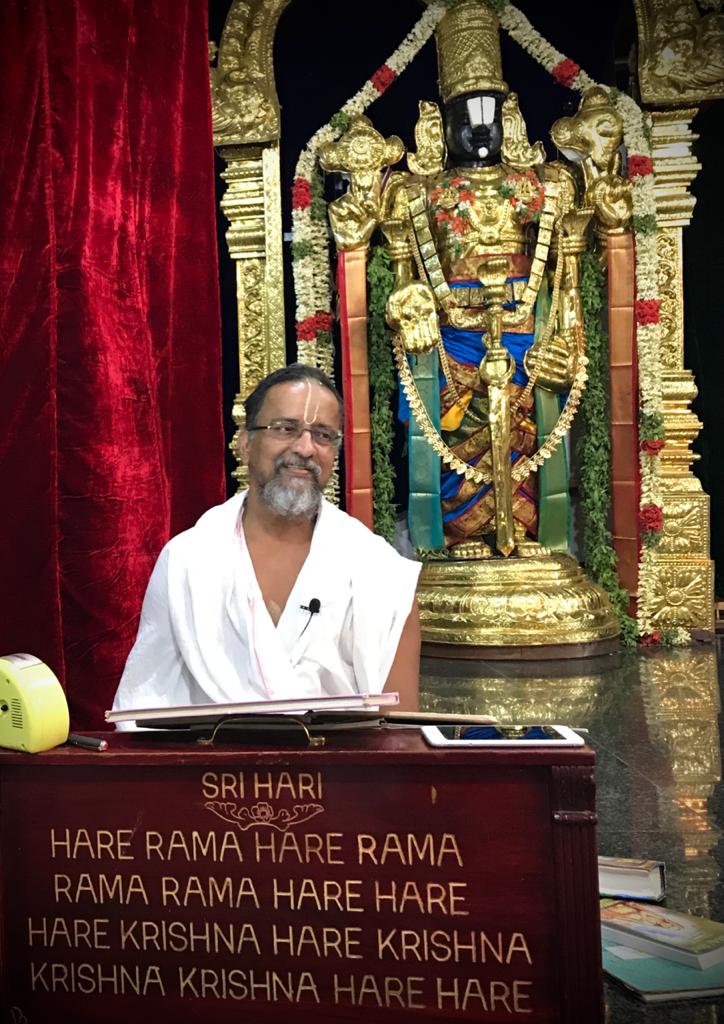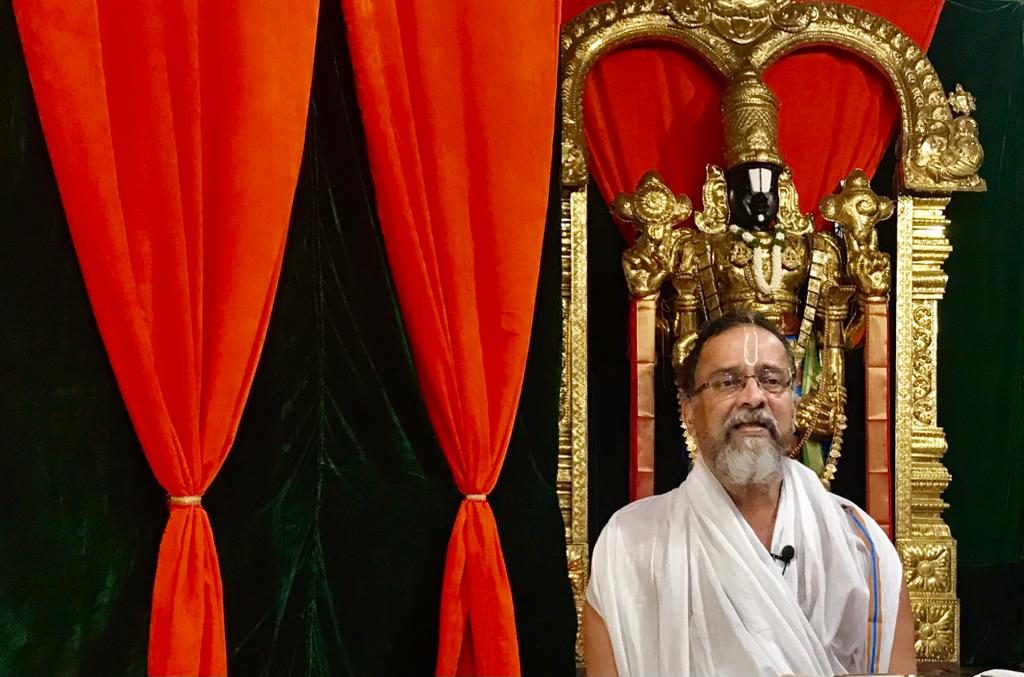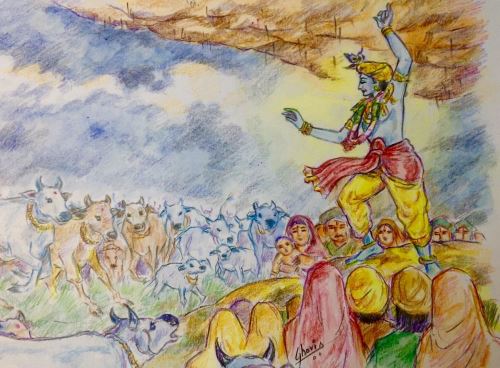This is the translated transcript of the second part of Sri Swamiji’s live online discourse on Apr 14, 2021.
For Part 1 of this discourse, which was the New Year message, please click here.
Original video on Global Organisation for Divinity Facebook page: https://www.facebook.com/globalorganisationfordivinity/videos/2970017786561145
 In Srimad Bhagavatam, before starting the 5th canto, right at the end of 4th canto, Sri Shuka says something interesting. He says that there was a king called Priyavrata; that he led a family life and was a great jnani even while being in family life. Sri Shuka, the narrator of Bhagavatam and a jnani himself, says this. Parikshit (the listener) is very surprised. He wonders how someone who was married and had children could be a jnani. When the 5th canto starts, Parikshit seeks to clarify his doubt.
In Srimad Bhagavatam, before starting the 5th canto, right at the end of 4th canto, Sri Shuka says something interesting. He says that there was a king called Priyavrata; that he led a family life and was a great jnani even while being in family life. Sri Shuka, the narrator of Bhagavatam and a jnani himself, says this. Parikshit (the listener) is very surprised. He wonders how someone who was married and had children could be a jnani. When the 5th canto starts, Parikshit seeks to clarify his doubt.
priyavratO bhAgavata AtmArAma: katham munE |
gruhE aramata yanmUla: karmabandha: parAbhava: || (SB 5.1.1)
“If someone is in a family life, will he not get the attachment, affection, and be bound by his karma? Because of that he will forget his real svarUpa and will not attain the jnana, isn’t it?”
The term parAbhava: means that the person’s atma jnana will disappear. What does this mean? It means that the thought that he has to attain atma jnana (self-realization) won’t even strike him.
What does a person in family life generally want? He will want his child to be happy, the son/daughter should get married at the right time, he should have grandsons and granddaughters, he should have a good job, and so on. This is how his thoughts would go, right? Then he will only think about what he can do for his family’s welfare. How will he get the thought of attaining jnana?
So Parikshit asks, “I am unable to comprehend how Priyavrata was an AtmArAma while being in family life.”
na nUnam muktasangAnAm tAdrshAnAm dvijarshabha
gṛheshu abhiniveshOyam pumsAm bhavitum arhati (SB 5.1.2)
Parikshit further asks, “Mahans like Priyavrata would not wish to be part of family life. They would want to move away from such family life. For such a person, how did he get the desire to pursue the family life?”
Sri Shuka beautifully replies to these questions:
bADham uktam bhagavata uttamashlokasya shrImaccharaNAravinda makaranda rasa Aveshitachetaso bhagavata paramahamsa dayitakathAm kinchid antarAyavihatAm svAm shivatamAm padavIm na prAyeNa hinvanti (SB 5.1.5)
Sri Shuka did not ask Parikshith why he asked such a question. Instead he explains, “Do you know what bhagavatas do? They always listen to Bhagavat katha – bhagavata paramahamsa dayitakathAm – and because of that, there have no disturbances in their lives – prAyeNa kinchid antarAyavihatAm .”
Now, let us contemplate on what sanyasa is. What renunciation means.
Generally, we imagine that wearing saffron attire is sanyasa or renunciation. It is all right when looked at from the perspective of shastra and anushtAna (daily rituals). Let us look at how a brahmachari, a grihastha, a vanaprastha, and a sanyasi need to be.
For example, a person may not be married but if his life was not pure, how can we call him a brahmachari? He might be considered a brahmachari from the eyes of the world, but in truth he is really not one!
If a grihastha is separated from his wife, how can he be called a grihastha?
This is all simply imagination. Just because someone is not married, can we call him a naishtika brahmachAri or urdhvaretas? If someone thinks like that, can there be another fool like him? We cannot call them like that. It is only an imagination, a misunderstanding. We can only call them unmarried, not ‘brahmachari.’
Similarly, renunciation does not lie in one’s attire.
During Bhagavan Ramana Maharshi’s time, there was a person who received sanyasa from someone. He wanted to impress Sri Ramana Maharshi and wanted him to ask him about his having taken sanyasa. So he went to Ramana Maharshi’s presence in his saffron clothes and walked about up and down deliberately in front of him. But why would Sri Ramana bother about all this? He remained quiet without reacting.
After waiting for a long time, this person could not bear it anymore and finally asked Sri Ramana, “Bhagavan, I have taken sanyasa and you have not asked me anything about it.”
To this, Sri Ramana replied, “All these days, you had a desire for a white dhoti. Now you have a desire to wear a saffron dhoti.”
So, if someone thinks that simply by wearing a saffron dhoti, carrying a dhanda (stick) and kamandalu, he will get dispassion and discrimination, and that all his vasanas (tendencies) will be destroyed, then everyone can wear it immediately, right?
The reason for wearing/carrying these is for that maturity of mind (dispassion) to come, and not because it has already come. Wearing the clothes of a sanyasi reminds him to stay away from worldly affairs, and for people to stay away from him. This attire acts as a sign that he should not be pulled into worldly matters.
Sant Tukaram was a married person and had children. In the end, he went to Vaikunta with his mortal body. Yes, with his mortal body! Only recently, within the last month, we celebrated the day that commemorates that incident. Before going to Vaikunta, he calls everyone and says, “Ram Ram,” to them while leaving.
In his final abhang he does an upadesa, “I have told everyone to do Bhagavan Nama kirtanam. It is because of Bhagavan Nama kirtan that I am going to Vaikunta.” His words and the greatness of Bhagavan Nama kirtan are proved true. Garuda azhwar comes and he leaves.
Do you who else went to Vaikunta in his mortal body, just like Tukaram? It was Poondhanam. For him also a divine vimana (vehicle) comes and he too leaves for Vaikunta while everyone is watching. These are all mahans who led a family life.
Can we call Sri Thyagaraja Swami a samsAri (one who is bound to the world)? But he was married. Can we call Sri Purandaradasa as a samsari? He was married. Can we call Sant Namdev a samsari? He was married. Can we call Sri Appaya Dikshatar a samsari? He also was married. Can we call Sri Neelakanta Dikshitar a samsari? He was a married person too.
Like them, there have been so many saints who were jnanis even while leading a family life. They have been jivanmuktas (free of worldly bondage even while living). Then how can we differentiate such people? Can we differentiate them based on their saffron attire? Or can we differentiate them based on their lifestyle? How can we differentiate such people?
There is a song in a book by name Devi Kaalotram. This is a Sanskrit work that has been translated beautifully into Tamil by Sri Ramana Maharshi.
In the part of the book called JnanAchAra VichAra Padalam, he says beautifully, “chittham siridhu asaya samsAram.” [When the mind moves even a little, it is samsara (worldly bondage)]
Your mind is constantly moving, right? It keeps thinking, “Shall I do this? Shall I do that? Why am I like this? When will I get jnana? When will I get bhakti? When will I get vairagya? I have worries. I have fears. I have thoughts that keep coming. Will I be successful or not?” Does something or the other keep coming up in your mind? Then you are a samsari. Even if you wear a saffron robe. Even if you have taken up sanyasa ashrama, if your mind keeps vacillating, then like this, then chittham siridhu asaya samsAram.
Sri Ramana did not just say chittham asaya (if the mind moves), he said siridhu asaya (even if it moves a little). Even if your mind wavers very slightly, then you are a samsari.
A sanyasi should not even get worries such as, “Why are such things happening in the world?” “Where is this world headed?”, etc. He should get no worries at all. Why? Have we created the world? Are we sustaining this world? Do we have any control over it?
For example, let’s say we are a guest at someone’s house. Can we ask them any unnecessary questions about their lives? In the same way, Bhagavan has sent us as his guests to the world that He has created. We can do nothing, but simply be quiet and observe. What can you change? When you do not have the power to rectify yourself, how can you advise others?
Sri Ramana often speaks of a matter that is spoken of in works of Vedanta. If we see in temple towers (gopuram), there will be a doll-like figure which is called “gopuram-thAngi bommai” (A doll to hold the temple tower). That doll will be leaning forward like it is holding the entire tower on its back. That is how our situation is. If that doll really thinks that it is holding the tower up, how ignorant it really is! That is how foolish we are as well if we think that we have control in this universe.
There are people who set out saying that they will ‘fix’ everything in this universe. Sri Ramana says how such a person is. Let’s say there is a person who is born with no legs. A few people are carrying him along in a forest path. Suddenly a tiger attacks them, and everyone starts to run away. The person with no legs told the others, “Somehow please make me stand up, and I shall kill this tiger.” He gives this example to say that you don’t have the capability to solve your own troubles (like this person was dependent on others to carry him around). Then how can you advise others in the world? Giving upadesa (advice) is itself ahankaram (ego).
Mahans do not do upadesa of Ramayana and Bhagavatam. They are in a divine state where they cannot stop themselves from speaking about the glories of Bhagavan. In such a state, words just pour out of them and others listen.
No one can do upadesa to others. Only Bhagavan can do upadesa.
These Mahans tell the stories and people listen, that’s all. Where is the question of upadesa here? If someone tells katha thinking that he is giving upadesa, he is the ajnani (ignorant). There is no use in listening to katha from him. Is there a greater ignorance than that?
So Sri Ramana beautifully uses the apt words here: chittham siridhu asaya samsAram – when the mind moves even slightly, you are a samsari.
The business of dealing with a wandering mind is more sorrowful than the business of dealing with daily activities and chores. There is no benefit from having such a vacillating mind. Do you know what such mind does? It only leads to mental ailments. The more your mind wanders and worries, the higher is the stress level. Then your blood pressure, sugar level, etc. will go up too. This will affect all the organs. So what should you do? Keep your mind still, without wavering.
How can I keep my mind still? For this Sri Ramana further explains.
Have you observed the trunk of an elephant? In olden days, they would have tied an elephant in front of temples. If it is an elephant that is very familiar with its surroundings, it will start pulling things and grabbing objects within its reach – it will pull the bicycle of a passerby, or pull a bottle of soda from someone else’s hands, a handbag from another person, or it will grab the grass from the ground and throw it on its own head, and move its trunk around.
Because this is troublesome for passersby, the mahout (elephant caretaker) will give a heavy iron chain for it to hold with its trunk. The elephant then holds it and the trunk stays still without moving. Similarly, if you want to still the wavering mind, you need to give it something to hold on to. You need to give it and make the mind hold on to it. Then it will stay steady. This is the way to keep the mind still. Otherwise, it will keep roaming around.
Here, we must note one thing. If you give some grass to the elephant, will it be able to still the trunk? No. If you give a small weightless stick, will it be still? No. Then, what should we do? Only when we give a heavy and strong object like an iron chain, the trunk stays in one place without movement due to the object’s weight.
Like that, we need give the mind something heavy to hold on to, like Sri Krishna charana or Bhagavan Nama. Do not think that this will immediately steady the mind. It will get used to it and try to move around again. Then you must keep pulling it back [to Nama].
From birth, you have been wandering around to different places, gone abroad, and indulging the senses by watching movies, TV, sports, etc. Then suddenly when you are 40 or 50 years old, how can you expect your mind become quiet and firm and expect to go into deep dhyana (meditation) in 5 minutes? How long have you run behind this world! So what do you do now? By chanting this Bhagavan Nama again and again and again, without giving up on this effort, bring the mind back. This is a way to keep the mind from moving around.
chittham siridhu asaya samsAram
nischalamAy chitthanilai nirkka mukti
What is moksha? If the mind is still; if there are no thoughts in the mind.
chittham idhu, chittham thiram Akkave vENDum
AdhalinAr dhImAn paramAm pragnayinAr pAr
Whatever you do, find a way to control the mind.
In Srimad Bhagavatam, 11th canto, Bhagavan Himself tells a story to Uddhava. Uddhava asks Bhagavan, “Generally in the world, we see that a lot of incidents keep happening in everyday life – people quarrel, use hurtful words, gain or lose possessions, and so on.”
So Uddhava asks, “Only those who are immersed in your Nama, rUpA , katha, and kirtan are not impacted by such worldly issues. How can others remain unimpacted by worldly happenings?”
Bhagavan commences saying, “Uddhava you have asked a good question. I will tell you a story. In the kingdom of Avanti, there lived a bhikshu (sanyasi) like this. He used to be a farmer who did a lot of business and earned well. He was a miser and neither spent for himself nor for his relatives, nor did he do any charity or good works with that money. In the end, he lost his entire wealth and everyone started to disown him. He became a sanyasi.”
He had to face a lot of trouble in sanyasa ashrama. Somebody broke his dhanda (sanyasi’s holy stick), some others spoilt his food by urinating on it, others physically hurt him by pulling his body and beating him; they all persecuted him in many ways. But even while being persecuted, the bhikshu would clap his hands and sing happily.
He thought, “All these days, I thought that the reason for my misery and sorrow were the planets; I thought that my karma was the cause; that vAstu was the reason; thought that the people around me were the reason for my sorrows; thought that the reason was that I had not acted intelligently. Like this, I imagined several reasons, but only now I have understood that the reason is indeed my mind.”
So he starts (Bhikshu Gita) by saying, “Planets are not the reason, karma is not the reason, people around me are not the reason, what I thought were missed opportunities are not the reason. Only my mind is the reason!”
Then he goes one step further.
You have gone to several temples since you were born, haven’t you? You have had darshan of Perumal in several temples. You have gone to Pandharpur, Badarikashram, Rameshwaram, Kasi, Gaya, to Ganga, to Maharudram, you did a lot of charity, dharma, rituals for pitrus (ancestors), you have done all this, right?
Did you ever have a question, “I did so much. What have I gained out of all these actions?” We need to question what fruit I got out of all this, right? When you help others, you expect something in return, don’t you?
Like that, since childhood, you have visited so many temples and tirthams, done so many good deeds, etc. You should have this natural question about whether you have got the fruit of all these actions, right?
The bhikshu himself says what the fruit of all these actions is:
sarvE manO nigraha lakshanAn tA: parO hi yOgO manasa: samAdhi: (SB 11.23.45)
To check if all the Bhagavad Bhakti and spiritual practices you have done this far has given you the fruit, ask yourself this question, and I will tell if you have passed or failed.
If your mind has come under your control, you have passed. If it has not come under your control, you have failed. In that case, you have done all these actions only as a show and without faith!
But if you have done all these properly,
sarvE manO nigraha lakshanAn tA: parO hi yOgO manasa: samAdhi:
First you must subdue your mind, only after that is samadhi. Only by subduing the mind, you can destroy it and annihilate your vasanas.
So if someone has controlled the mind very well, Sri Ramana says
adhudhAnE muktikku upAyam
adhuve chatupAyar sArguNam thAnum
adhuvE pragnai sthiratthanmai pinnum adhuvE dharmam vivekyarkku dhAn
adhuve narthIrtham
adhuve dhAnam adhuvE thavam Agum
aiyam idhil illai
evvupAyathinalE vAyuvirchalana ivvuLLam kaTTappaDumOven
What he says here is: “I don’t know what you will do. Do something, anything; somehow, control your mind!”
Sri Ramana is beautifully articulating that – evvupAyathinalE vAyuvirchalana ivvuLLam kaTTappaDumO
“Somehow control that mind that is restless and wandering like the wind and like a disembodied spirit! If you are able to subdue it, adhu dhAnE muktikku upAyam (that is the solution for mukti).”
“You are talking about moksha moksha… this is the most important to attain mukti.”
adhu dhAnE muktikku upAyam
adhuve chatupAyar sArguNam thAnum
Sadhus search for satvastu, satsanga, and for other sadhus… this is what it is!
adhuvE pragnai adhuvE sthiratthanmai
As a mumukshu (a serious spiritual aspirant), you should not even go around doing dharmic activities, that will also create bondage. Controlling the mind is the dharma, for who? For those who are vivekis (vivEkiyarkku).
Then you do not have to go around Ganga, Kaveri, etc. Why? Since you have controlled the mind, that itself is a holy tirtha – [adhuvE narthIrtam].
[adhuveyAm dhAnam] – You don’t need to run around saying, “Today I shall do this charity, I shall donate clothes, I shall donate food, etc.” Control your mind; that itself is charity – [adhuve dhAnam]
You say you want to do tapas, tapas. This is the tapas – [adhuvE tavam Agum]. There is no doubt – [idhil aiyam illai]. Be firm in this. Because the mind is the reason for all sorrows. It is the mind that is the reason for all sorrows.
For example, what does your cardiologist study? He learns how your heart functions. What does a pancreas specialist do? He learns all about your pancreas. What does an ortho do? He learns about the human bones.
Like that, a mumukshu who is keen to do dhyana, should learn about the mind. The mind is an illusion. It something that is non-existent, imaginary. When we fan a fire the smoke grows and spreads more and more. Similarly, as you feed more and more fears to the mind, it grows bigger.
Mind has two types of nature (svabhAva). When we light a lamp, the flame burns upwards. When we pour water, it flows downwards. Like that, the first nature of mind is that right from childhood, it always moves outward (toward the world). Then the second nature is that it always thinks about everything in a negative way. This is also a nature of the mind. You must win over both these traits.
The mind that runs outwards needs to be turned inward. The mind that sees everything from the wrong perspective needs to be made to see the right perspective through discriminative knowledge (viveka).
To turn the mind inwards, you need a sadhana. To change the mind from thinking negatively, you need to adapt a practical approach with the help of viveka. When you start questioning, “Why did this happen?”, also ask “Why shouldn’t it happen like this? This is nature of the world.” Then that thought will not grow.
“Why did it rain today?”… “Why shouldn’t it rain?” “Why is the sun so hot today?”… “Why shouldn’t it be hot?” Because it is the nature of the world. If we bring this viveka into the mind, then the mind will come well into our control.
So this is a beautiful Tamil song,
chittham siridhu asaya samsAram
nicchalamA chittha nilai nirka
mukti chittham idhu
chittham shtiram AkkavE vENDum
AdhalinAl dhrImAn paramAn pragnayinAl pAr
The mind is only our enemy. If you want to win over an enemy, what should you do? You must be aware of the enemy’s strengths, his origin, his name, etc.
Say there is a weak person. He comes to us and boasts (falsely) that he will do this and that and threatens us. So, we fear him. But in fact, he is not capable of causing any real danger. If we stand up to him and challenge him, he will run away thinking that his reality will get exposed.
Like that this mind is causing fear in you. Stare back at it; it will get terrified and will run away – manasu yAr enDru vijArikka adhu than iruppai izhandhu viDum
This is the way to control and destroy the mind.
GopikA jIvanasmaranam, GovindA GovindA!
Hare Rama Hare Rama Rama Rama Hare Hare
Hare Krishna Hare Krishna Krishna Krishna Hare Hare
Click here to go to the main blog page and see the other discourse posts: bit.ly/madhuravaani







